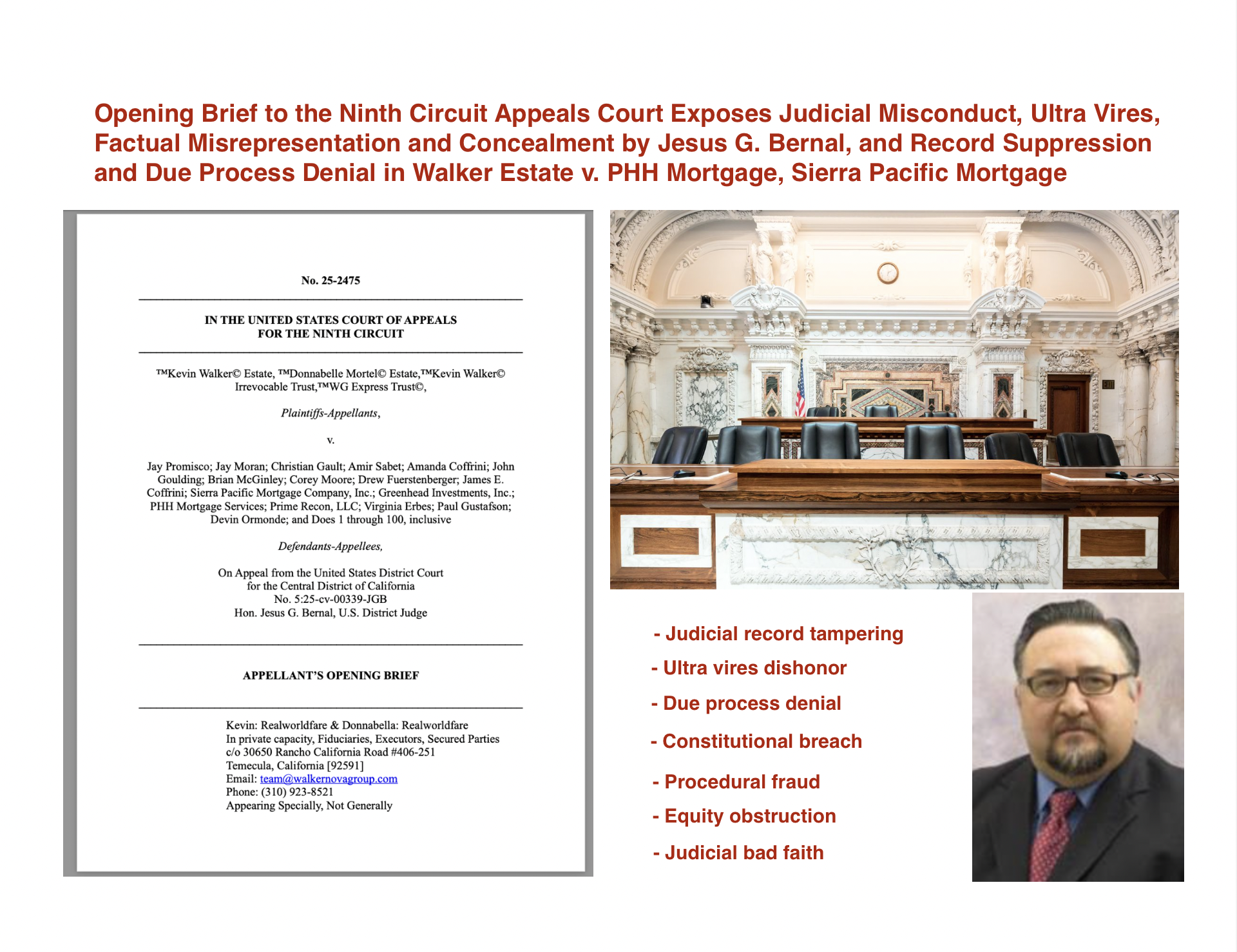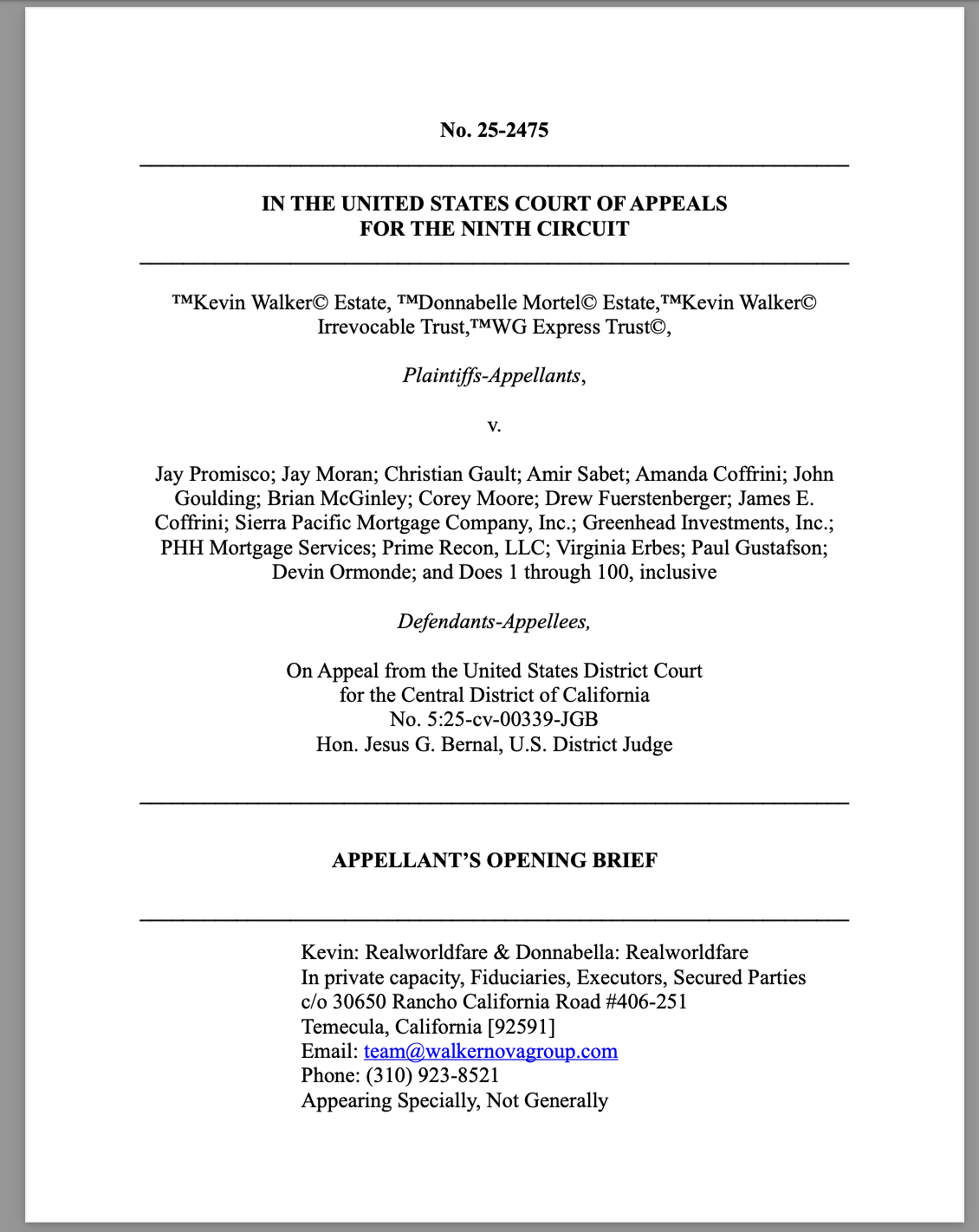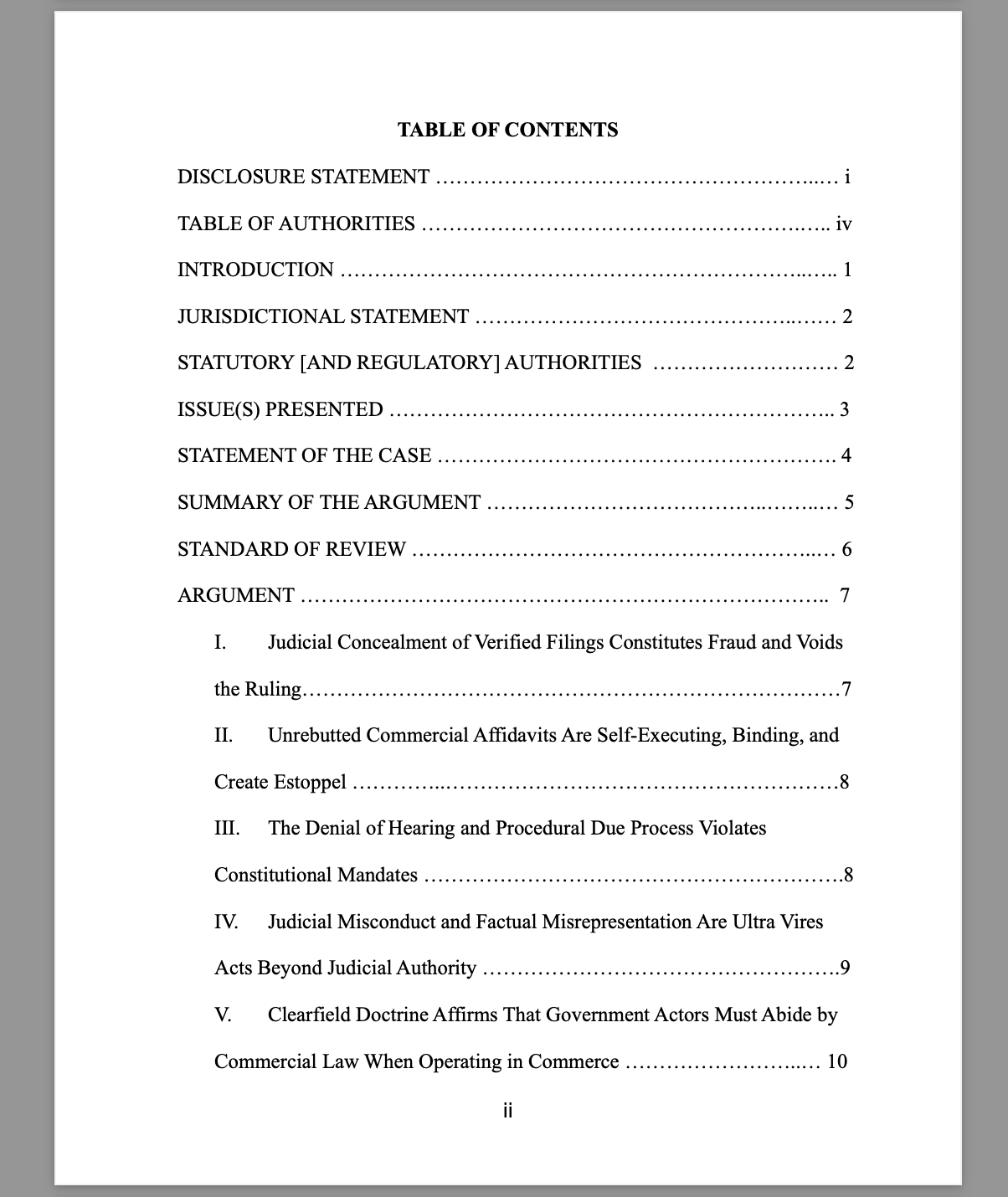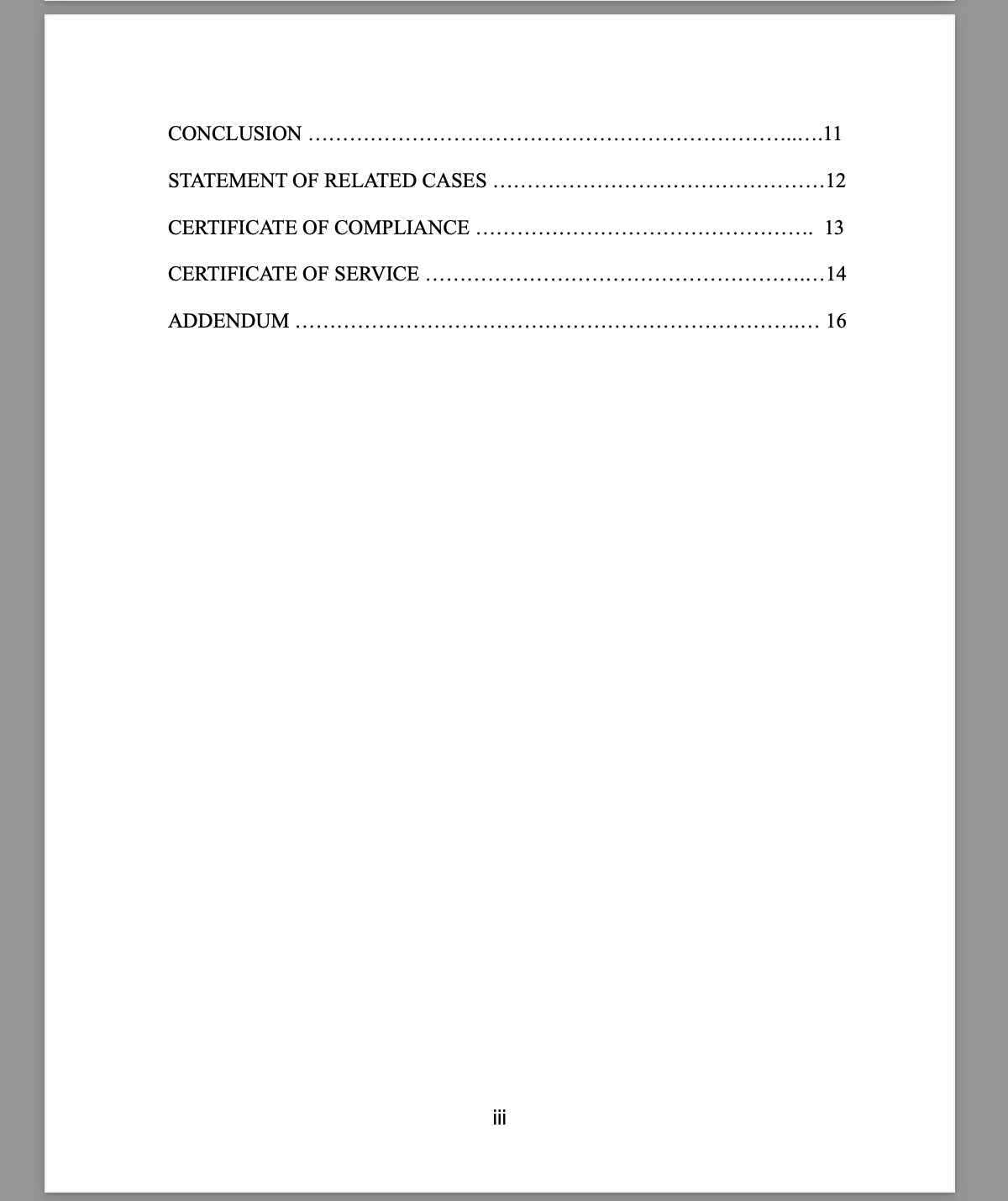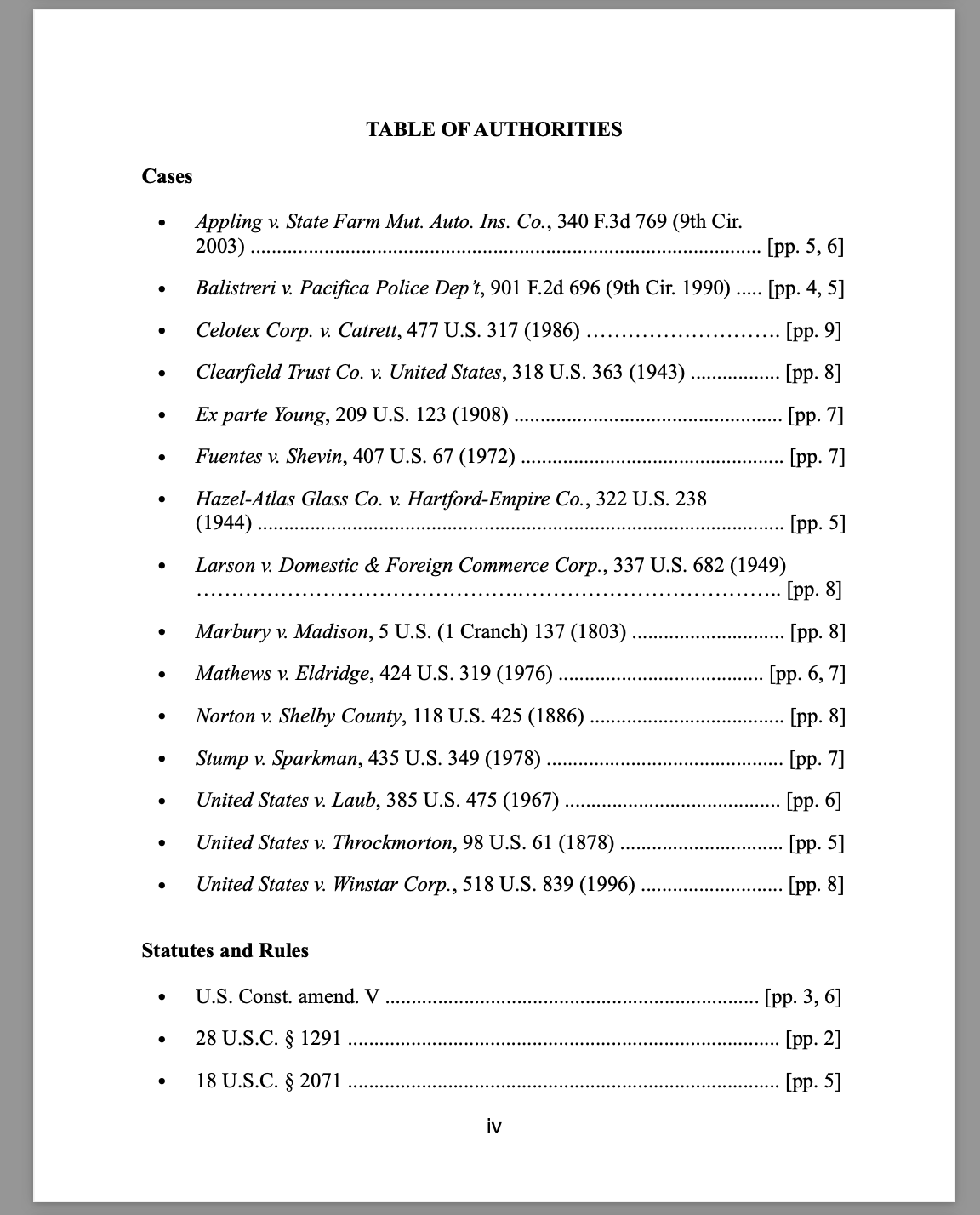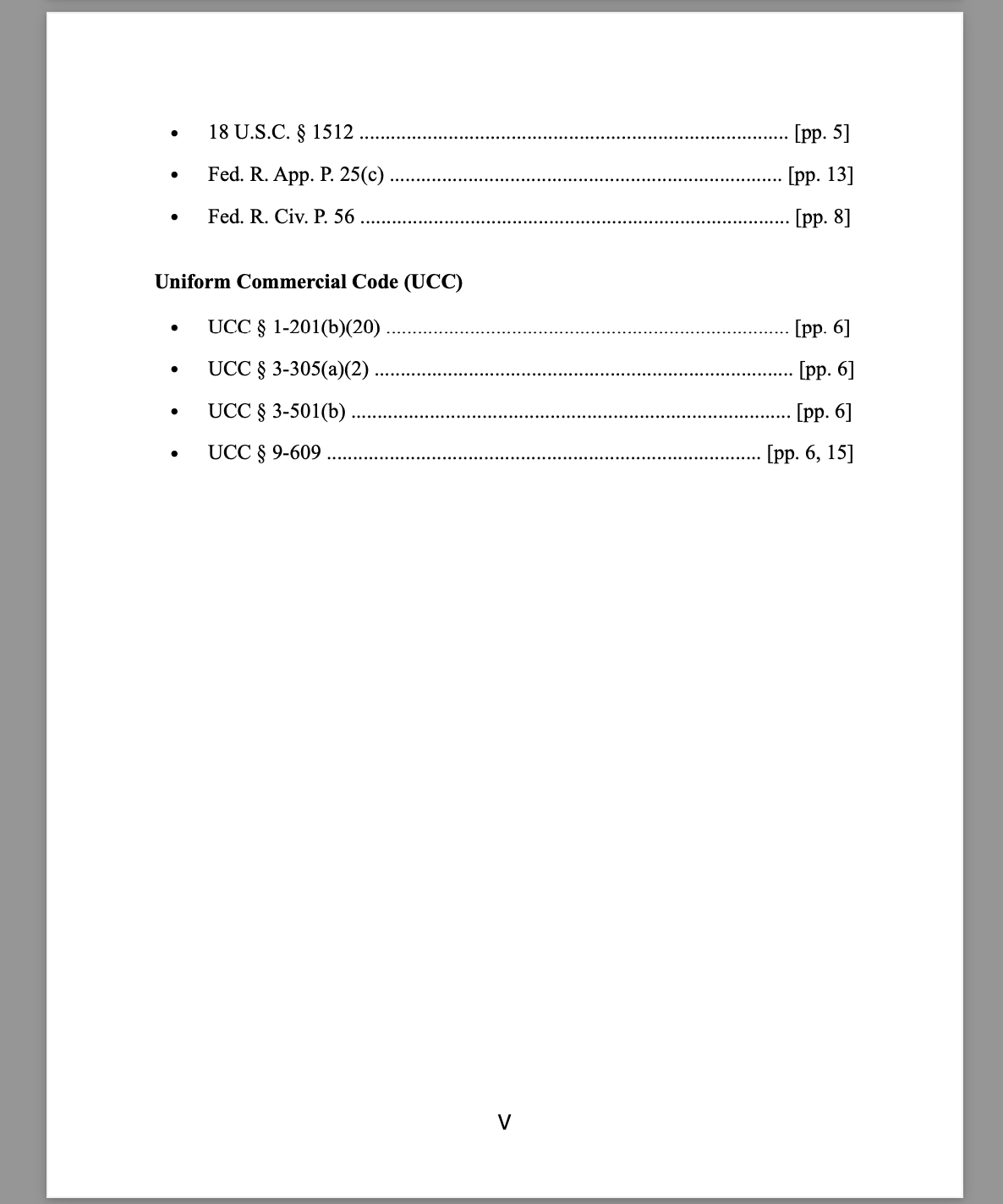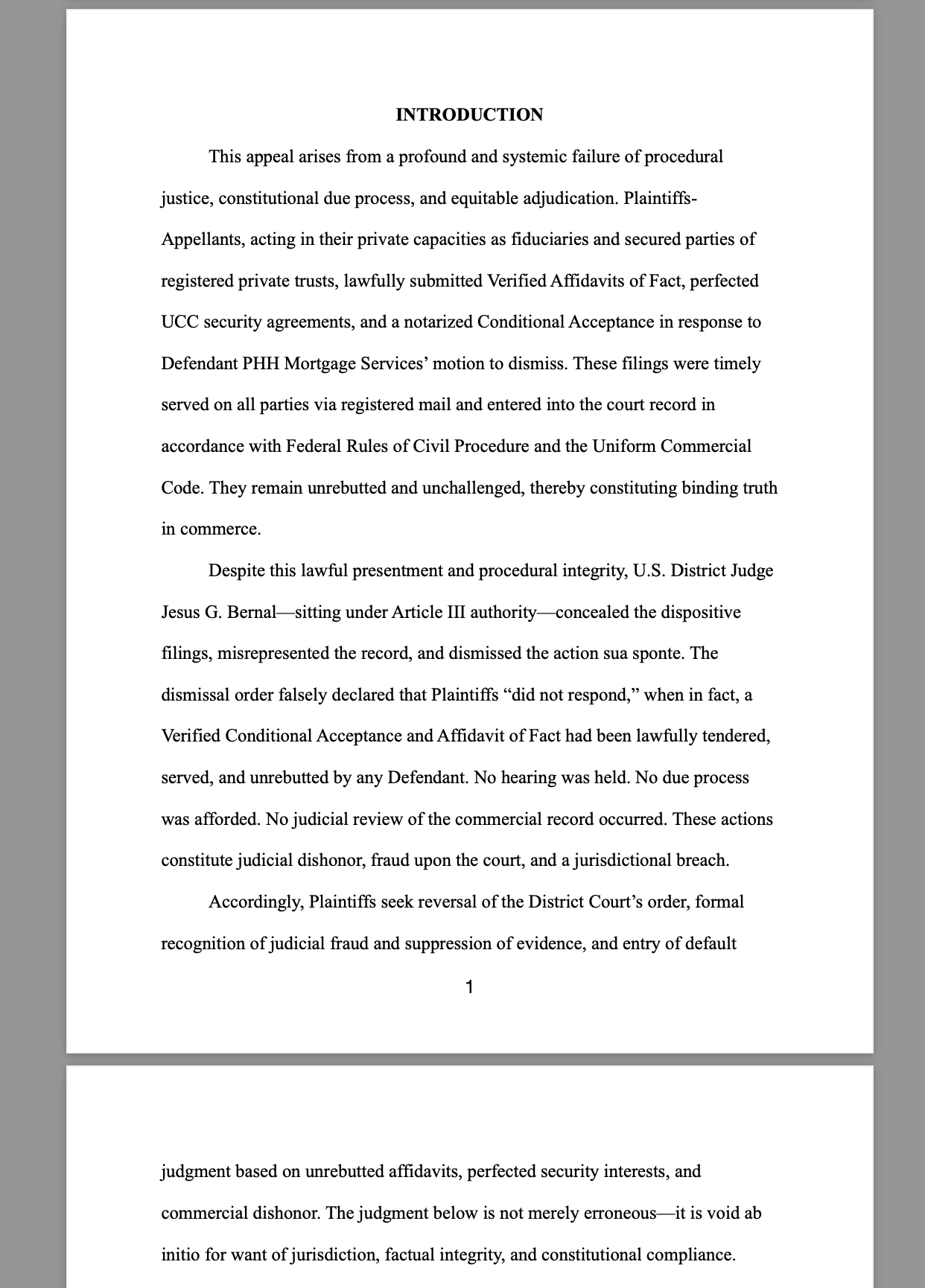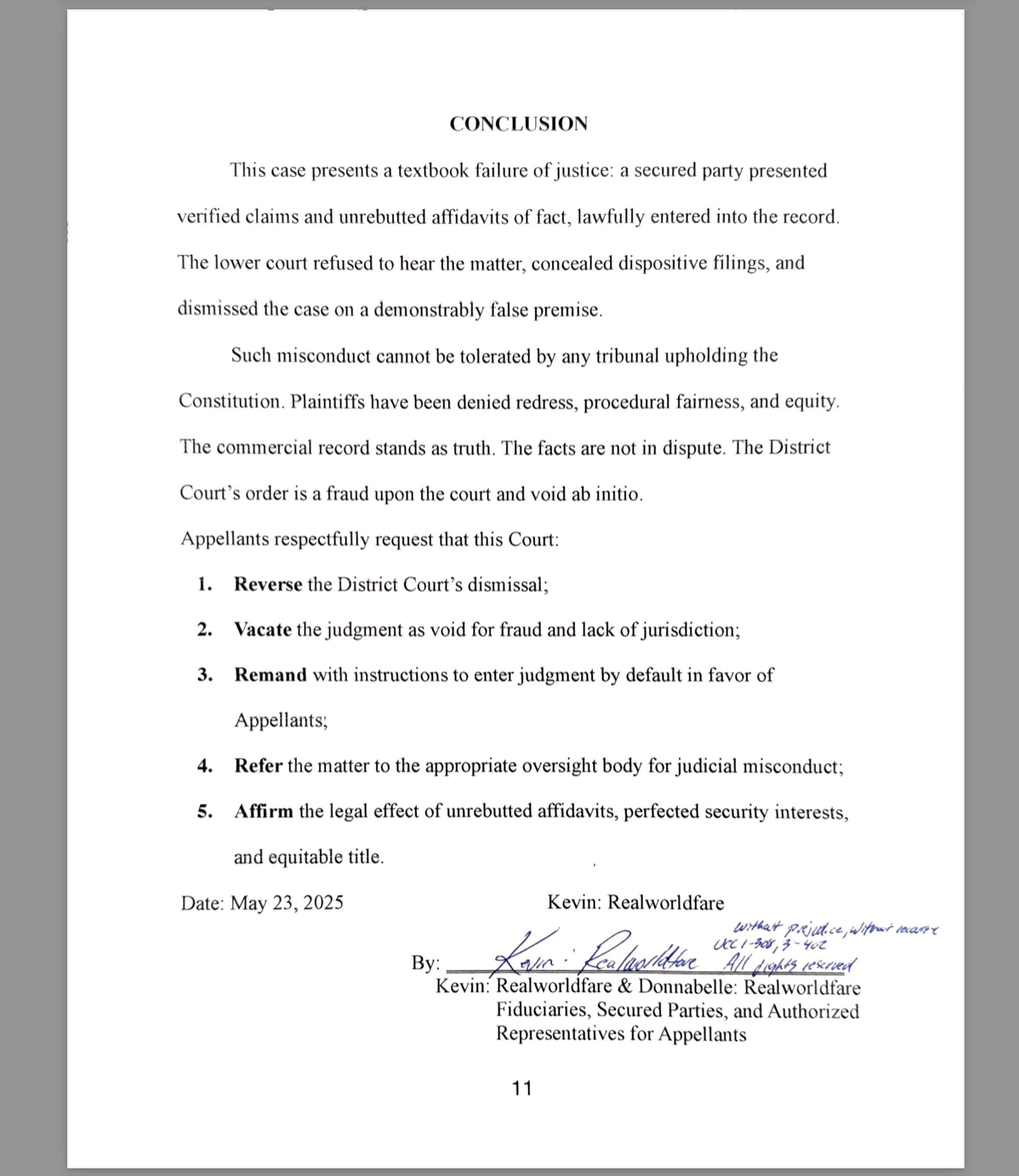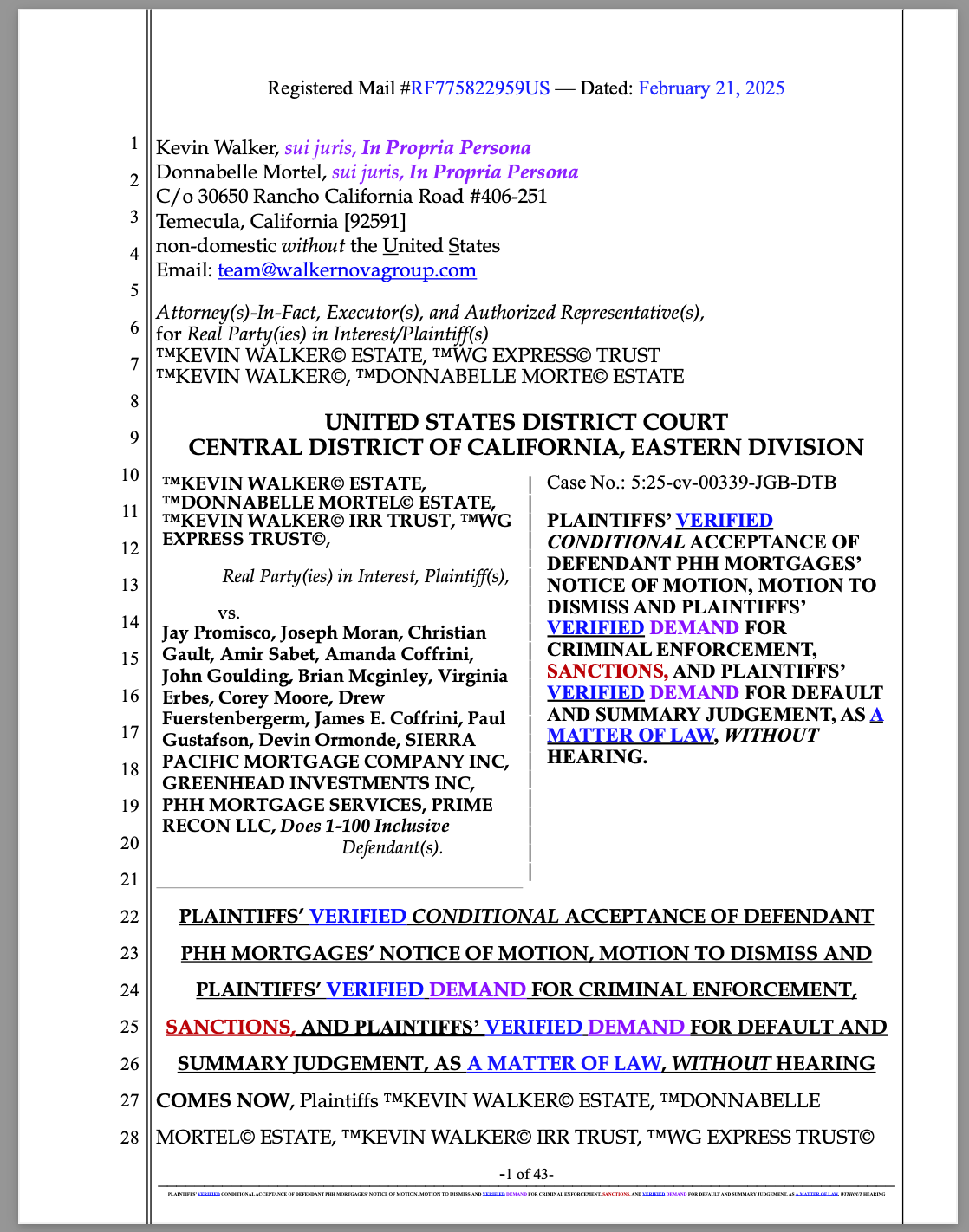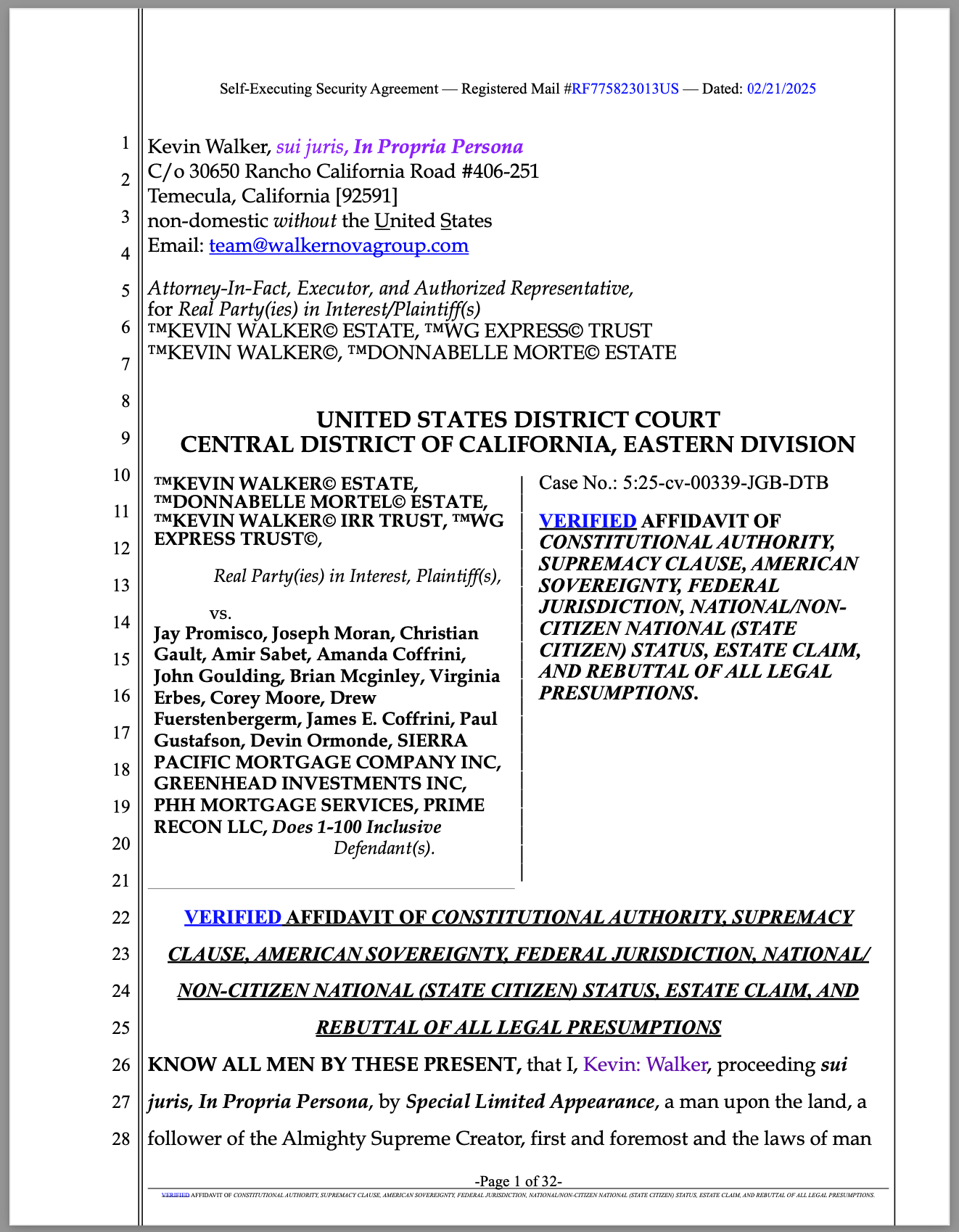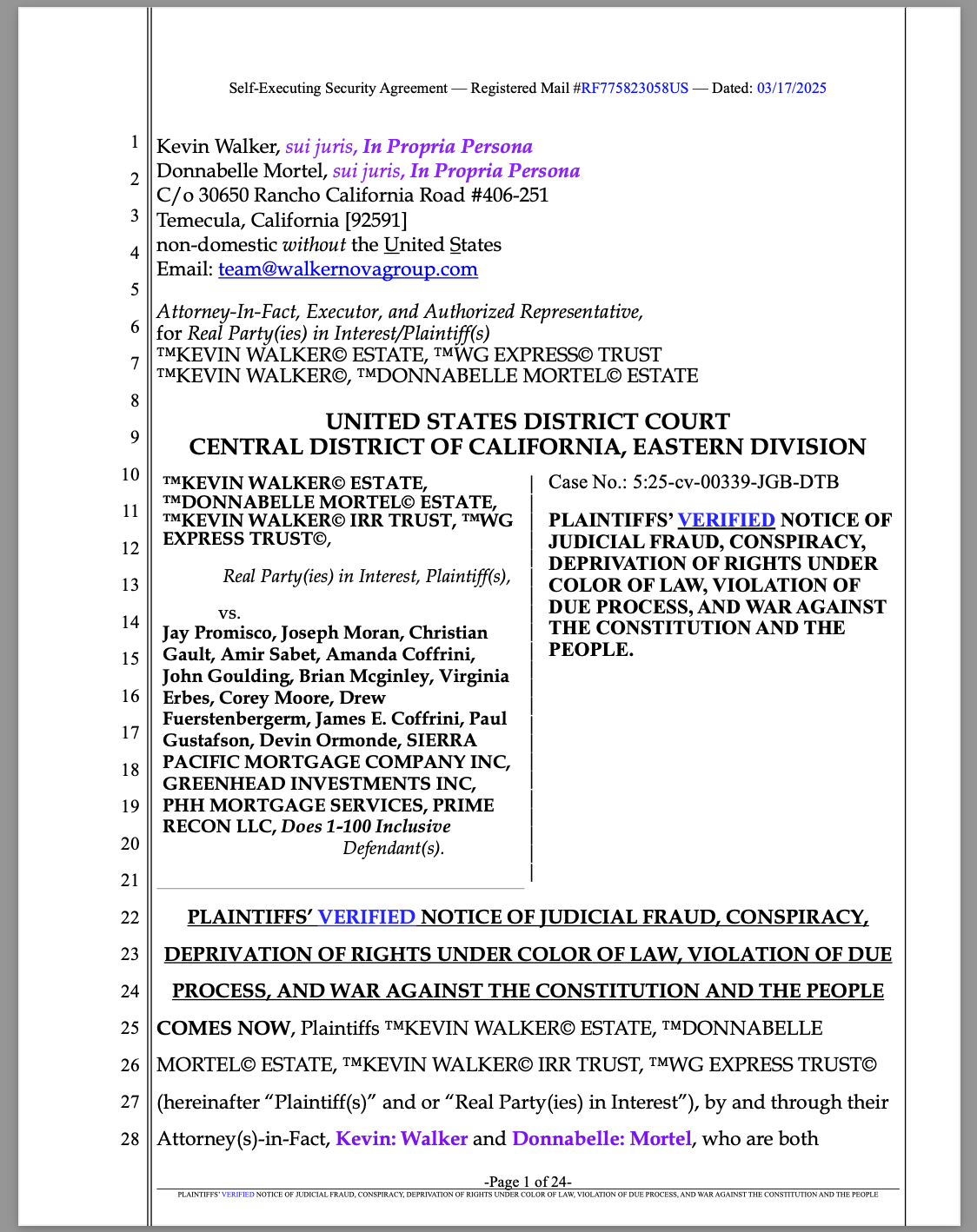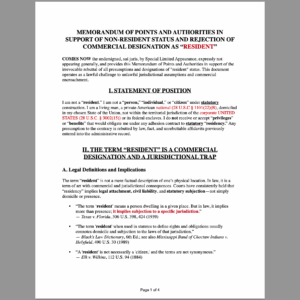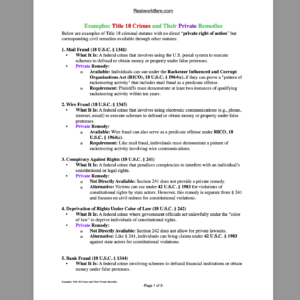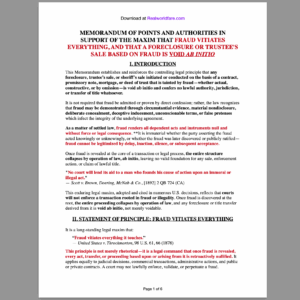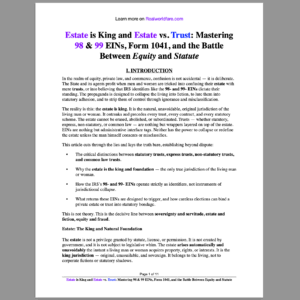In a case now before the United States Court of Appeals for the Ninth Circuit, Plaintiffs-Appellants Kevin: Realworldfare, Donnabelle: Realworldfare, and their associated private trusts have exposed what may be one of the most egregious and unconscionable examples of judicial misconduct in recent federal history. The appeal in Walker Estate v. PHH Mortgage Services, et al., Case No. 25-2475, challenges the ultra vires conduct of Judge Jesus G. Bernal of the U.S. District Court for the Central District of California—conduct that not only violates foundational principles of constitutional law, but which may also constitute a criminal obstruction of justice and fraud upon the court.
The Facts They Suppressed
At the heart of this legal crisis lies a simple but devastating truth: Plaintiffs lawfully filed and served a Verified Conditional Acceptance and an Affidavit of Fact in response to a motion to dismiss. These documents were not only procedurally proper and timely, but they remain unrebutted—a condition that, under the Uniform Commercial Code and well-settled maxims of equity, creates binding estoppel, default, and judgment by tacit acquiescence.
Rather than acknowledge these filings, Judge Bernal concealed them from the record, and in his March 28, 2025, ruling, falsely claimed Plaintiffs “did not respond.” No hearing was held. No adjudication occurred. No due process was afforded. The result: dismissal by falsehood, fraud, and concealment.
Three Key Documents Omitted from the Docket
The Plaintiffs had submitted the following verified filings, which were:
-
Lawfully formatted
-
Notarized and sworn under penalty of perjury
-
Submitted via proper channels
-
Never acknowledged, entered into the docket, or addressed by the court
1. VERIFIED Affidavit of Constitutional Authority, Supremacy Clause, American Sovereignty, Federal Jurisdiction, National/Non-Citizen National (State Citizen) Status, Estate Claim, and Rebuttal of All Legal Presumptions
This affidavit lawfully rebutted all presumptions of statutory jurisdiction, clarified the Plaintiffs’ status as American Nationals and State Citizens—not 14th Amendment federal citizens—and invoked authority under the Supremacy Clause (Art. VI), Title 8, and other federal jurisdictional limits.
2. PLAINTIFFS’ VERIFIED CONDITIONAL ACCEPTANCE OF DEFENDANT PHH MORTGAGE’S NOTICE OF MOTION, MOTION TO DISMISS AND PLAINTIFFS’ VERIFIED DEMAND FOR CRIMINAL ENFORCEMENT, SANCTIONS, AND PLAINTIFFS’ VERIFIED DEMAND FOR DEFAULT AND SUMMARY JUDGEMENT, AS A MATTER OF LAW, WITHOUT HEARING
This filing conditionally accepted Defendant’s motion under the law of contracts and demanded relief due to the Defendant’s failure to provide material rebuttals to the Plaintiffs’ verified claims. It included demands for sanctions, default, and summary judgment pursuant to unrebutted affidavits and Rule 56.
3. PLAINTIFFS’ VERIFIED NOTICE OF JUDICIAL FRAUD, CONSPIRACY, DEPRIVATION OF RIGHTS UNDER COLOR OF LAW, VIOLATION OF DUE PROCESS, AND WAR AGAINST THE CONSTITUTION AND THE PEOPLE
This was a direct notice to the court and record of alleged acts of misconduct, fraud, and conspiracy, including the failure to address previously submitted material, evidence of color of law activity, and a judicial war on constitutional process and trust-based claims.
All three documents were concealed from the public record.



Confirmed Judicial Fraud and Conspiracy: Judge Jesus G. Bernal Conceals Affidavit, Notice, and Conditional Acceptance, and Dismisses Case In Chambers Under Color of Law
Judicial Dishonor and Constitutional Collapse
Such conduct violates the Fifth Amendment right to due process, and flies in the face of Marbury v. Madison, which holds that any act contrary to the Constitution is void ab initio. Worse, by actively suppressing dispositive evidence and issuing a ruling based on an affirmatively false factual predicate, Judge Bernal operated ultra vires—outside his lawful judicial authority. As the U.S. Supreme Court affirmed in Larson v. Domestic & Foreign Commerce Corp., judicial acts that exceed jurisdiction are not protected by immunity and are legally null.
This is not a mere technical error. It is a systematic betrayal of judicial duty—a breach so severe it satisfies every element of fraud upon the court under Hazel-Atlas Glass Co. v. Hartford-Empire Co., and possibly violates federal criminal statutes, including 18 U.S.C. §§ 2071 and 1512, governing concealment of records and obstruction of justice.
Commerce and Constitutional Standing
The Plaintiffs did not appear before the District Court as pro se claimants, but as secured parties, private fiduciaries, and equitable title holders with perfected legal standing under commercial and trust law. Their claims were not merely asserted—they were evidenced and certified through lawfully executed UCC financing statements, verified commercial affidavits, and an Affidavit Certificate of Non-Response, Dishonor, and Default, which remains unrebutted and stands as truth in commerce. The record also includes a formal Certification of Service, confirming lawful presentment to all named parties. Under UCC §§ 3-305, 3-505, 3-603, and 9-609, these filings triggered an immediate legal obligation to rebut or perform; failure to do so constitutes commercial dishonor, default, and consent by acquiescence. Judge Bernal’s refusal to acknowledge or address these instruments was not a procedural lapse—it was a deliberate act of judicial dishonor, concealment, and ultra vires obstruction. In violating the Clearfield Doctrine, the court abandoned its Article III limitations and acted as a partisan shield for commercial actors, thereby rendering its judgment void for want of lawful authority, equity, and conscience.
The Implications: A Crisis of Legitimacy
If affirmed, Judge Bernal’s order would effectively bless a judicial system that rewards concealment, punishes lawful notice, and annihilates due process. It would declare that even verified affidavits, when unrebutted, can be discarded by fiat. That judges may suppress evidence, lie about the record, and do so with impunity. That is not the rule of law—it is judicial tyranny.
This appeal demands that the Ninth Circuit draw a bright line between lawful adjudication and institutional corruption. The remedy is not merely reversal. It is the judicial recognition of fraud, the vacatur of a void order, and the restoration of lawful process and equity.
What Must Happen Now
The Ninth Circuit must act decisively. First, the order of dismissal should be vacated as void for fraud and lack of jurisdiction. Second, summary judgment should be entered in favor of the Plaintiffs based on unrebutted commercial affidavits and perfected security instruments. Third, Judge Bernal should be referred for investigation under the Judicial Conduct and Disability Act for obstruction of process and suppression of evidence. Finally, this case must serve as a warning and precedent: the integrity of the judicial process is not a matter of discretion—it is the foundation of constitutional legitimacy. Where judges act ultra vires and cloak fraud under robes of authority, they do not administer law—they betray it.
